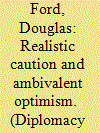| Srl | Item |
| 1 |
ID:
090545


|
|
|
|
|
| Publication |
2009.
|
| Summary/Abstract |
During the opening stages of the Pacific War, between December 1941 and spring 1942, the Imperial Japanese Army appeared unstoppable. US forces in the Philippines, despite their efforts, could not hold out against the enemy advance, and by April the last vestiges of their resistance at Bataan and Corregidor became untenable. The intelligence obtained during the initial encounters provided the US defense establishment with undeniable reasons to conclude that Japanese ground forces possessed a high level of tactical skill, and assessments of the Imperial Japanese Army tended to exaggerate the latter's capabilities.
|
|
|
|
|
|
|
|
|
|
|
|
|
|
|
|
| 2 |
ID:
096913


|
|
|
|
|
| Publication |
2010.
|
| Summary/Abstract |
Throughout the years prior to the outbreak of the Pacific War, the United States defence establishment held an ambiguous view on Japanese policy and strategic aims. A number of factors precluded a clear-cut forecast, among the most important of which was the opportunistic and secretive manner in which Japanese leaders formulated their plans. Under the circumstances, the available intelligence could not provide a definite indication of the moves which the Imperial Japanese Navy (IJN) and Imperial Japanese Army (IJA) would undertake. The situation was further complicated because reliable pieces of evidence revealed Japan did not possess the military and economic resources to defeat a coalition of several Great Powers. The Americans were thus not inclined to expect the Imperial forces to undertake a full-scale conquest of the Asia-Pacific region. The inadequate knowledge of Japanese war plans, in turn, was one of the key factors which led United States defence officials to believe that efforts to bolster their military strength in the Far East were not necessary.
|
|
|
|
|
|
|
|
|
|
|
|
|
|
|
|